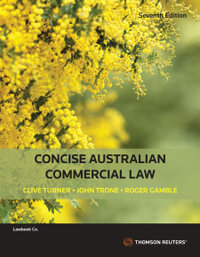A legal guide to starting and running an online business or commercial website. Topics: Starting a business; kinds of business entities; raising capital; securities regulations; management; employment; franchising; unfair competition; bankruptcy; debt collections; basic sales and contract law; electronic signatures and e-contracts; credit card, debit card, and ETF transactions; delivery obligations; cancellations; chargebacks; sales taxes; data security; privacy; publicity rights; false advertising; disclosure requirements; trade disparagement; defamation; rights and obligations with respect to children; sexually explicit content; computer crime, fraud and abuse; liability for user or other third-party content; product reviews; content restrictions in the U.S. and other countries; copyright law; the public domain; fair use; DMCA notice-and-take-down requirements; copyright protection measures; trademarks; domain names; cybersquatting; patents; trade secrets; legal protection for ideas and factual information; licensing content; jurisdiction and venue in cyberspace; conflicts of laws; UDRP and other alternative methods of resolving e-commerce disputes; and more.Detailed yet easy-to-understand explanations of relevant portions of the CAN-SPAM Act, the Digital Millennium Copyright Act (DMCA), the Anticybersquatting Consumer Protection Act, the Children's Online Privacy Protection Act (COPPA), the Credit Card Accountability, Responsibility and Disclosure Act, the Consumer Review Fairness Act, the Cybersecurity Information Sharing Act, the Computer Fraud and Abuse Act, the Communications Decency Act, the Electronic Communications Privacy Act, the Electronic Funds Transfer Act, the E-SIGN Act, the Fair and Accurate Credit Transactions Act, the Fair Credit Billing Act, the Federal Trade Commission Act, the Fair Credit Reporting Act, the Fair Debt Collection Practices Act, the Gramm-Leach-Bliley and Sarbanes-Oxley Acts, the Health Insurance Portability and Accountability Act (HIPAA), the HITECH Act, the Internet Tax Freedom Act, the General Data Protection Regulation (GDPR), the Student Online Personal Information Protection Act, the Personal Information Protection and Electronic Documents Act, the SPEECH Act, the PCI Data Security Standard, the Copyright Act; the Lanham Act, the Restore Online Shoppers' Confidence Ac, the SAFE WEB Act, the Uniform Commercial Code (UCC), the Uniform Computer Information Transactions Act, the Uniform Deceptive Trade Practices Act, the Uniform Electronic Transactions Act, the Uniform Trade Secrets Act, the USA FREEDOM Act, the PATRIOT Act, the Telemarketing Sales Rule, the Visual Artists Rights Act, and pertinent international treaties and conventions. A useful reference for both online business owners and the attorneys who advise them. 815 pp. Index; bibliography; table of abbreviations; table of statutes and cases. Tom James is a private practice attorney with over twenty years of experience. He is admitted to the bar in the Federal District (District of Columbia) and Eighth Circuit Courts of Appeals, Minnesota state and federal courts, and the Trademark Trials and Appeals Board. His articles on e-commerce topics have appeared in such varied places as the Illinois Law Review, the Mitchell-Hamline Journal of Public Policy and Practice, Sales Tax Notes, and AllBusiness.com. Other titles by this author: Website Law and Copyright Protection for Websites.
























